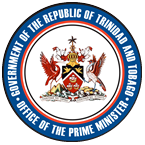- 25 AUG 2016
Post Cabinet Briefing Summary – Thursday 25th August, 2016
The Honourable Terrance Deyalsingh, Minister of Health, as well as the Honourable Clarence Rambharat, Minister of Agriculture, Land and Fisheries, addressed members of the media during the Post Cabinet Press Briefing today (Thursday 25th August, 2016) at the Office of the Prime Minister, St. Clair, Port of Spain.
Minister Deyalsingh addressed the shortage of drugs, particularly oncology drugs, in the health care system. While offering the assurance that the ministry is working to bring relief, he noted that there is great difficulty in establishing a regular supply of drugs to Trinidad and Tobago as it requires coordination with eight (8) entities, including the various regional health authorities. In addition, the Ministry of Health is not equipped with a division mandated to monitor suppliers.
As part of the solution to this challenge, Minister Deyalsingh proposes that the Ministry of Health adopts a leadership position to gather data from RHA’s so as to improve the procurement of drugs. Minister Deyalsingh also maintained that no patient requiring oncology medication has regressed due to the shortage of drugs; all are stable on second line treatments. The immediate drug shortage will be alleviated in three to five weeks at which time the drugs ordered using emergency funds are expected to arrive.
Minister Deyalsingh also convened a round table discussion with public and private health professionals to discuss an approach to the Zika virus. He urges members of the public to work with the Government to eliminate breeding sites in and around homes. According to Minister Deyalsingh, the Zika outbreak has expanded from tropical countries to temperate countries. Additionally, the Minister is scheduled to meet with public health inspectors next week and will emphasise the implementation of fines for environmental infractions which range up to $3500.00.
The Minister of Health also addressed the outbreak of an Enterobacter virus at the neonatal ward of the Port of Spain General Hospital. He clarified that the virus was imported to the ward via a mother and is not the fault of the hospital. All affected babes were isolated, treated and are doing well – they are at no risk.
The Minister of Agriculture, Land and Fisheries also addressed the Post Cabinet Press Briefing. Minister Rambharat announced that the Environmental Management Authority (EMA) has been engaged to assist in addressing the most recent issue raised by fishermen – the washing up of dead fish along western coastlines. Minister Rambharat noted that the fishes that appeared initially were as a result of dumping by trawlers and that the Government recognises the need to review the guidelines which govern trawling.
The minister also noted that the most recent reports by the EMA and the Caribbean Industrial Research Institute (CARIRI) indicate a presence of hydrocarbons in bottom feeders, particularly catfish. However, the EMA has highlighted that the levels were not significant enough to warrant concern and that it is not unusual to find hydrocarbons in bottom feeders due to the oil deposits around the island. Minister Rambharat also noted that crab catchers have also been complaining of presence of crude oil.
He went on to state that samples (of fish and soil) will be sent for testing at international labs and that the Government must deal with the issue of liability for what is taking place.
Prime Minister Dr Rowley also addressed the gathering on the issue of violent crime. Prime Minister Rowley maintained that it is the responsibility of the Government to mitigate and eliminate, where possible, the occurrence of violent crimes.
Dr. Rowley also emphasised that the structure of State to respond to the criminal element remains intact, is vigorous and is on the front burner.
The Prime Minister went on to affirm that the National Security Council is functioning and is providing all the support required to the agencies which work together to combat crime. However, because meetings take place behind closed doors, persons may think that the council is not working.
Dr. Rowley noted that a primary focus of the Government is to ensure that the Trinidad and Tobago Police Service (TTPS) is properly resourced; this includes the appointment of Commissioner of Police.
Prime Minister Rowley highlighted that there are limits to the extent of intervention that can be made by the Prime Minister and the Cabinet and that as we attempt to politicise crime, everyone in this country is threatened. He stated that the Government is not satisfied with the current arrangements but continues to work toward improvement. Dr. Rowley also pointed out that greater trust between the public and the police service is required in order to better fight crime
Dr. Rowley also addressed recent criticism of the Government for misplaced priorities and insisted that this is due to misinformation. He clarified that, in 2014, Governments of the hemisphere met to discuss cooperation and collaboration on security matters. The Government of Trinidad and Tobago at that time volunteered to host the subsequent meeting and agreed to the cost of 16.5 B TTD. Upon coming into office in September 2015, the new administration reviewed this arrangement and even considered withdrawing the offer. Instead, it was decided to follow through with the commitment made and reduce the budget from 16.6B TTD to 9B TTD.
Prime Minister Rowley emphasised that the fight against crime is not simplistic but multifaceted and that crime fighting in Trinidad and Tobago is at the forefront of the Government’s priorities.





